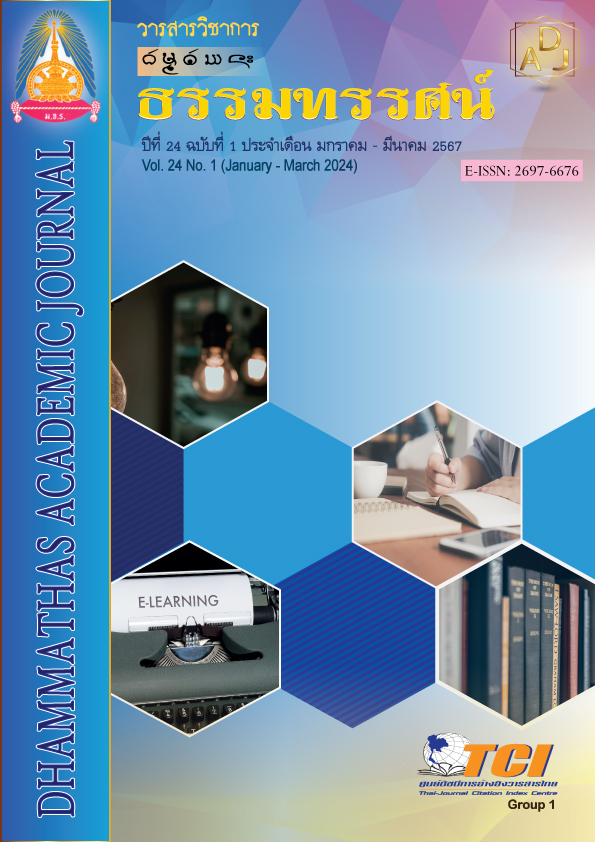Executive Training Program for Local Leaders: Learning to Local Development of Leaders in Chaiyaphum Province
Main Article Content
Abstract
The purposes of this research were; 1) to study political culture type for behavior development, 2) to develop the new political idea, 3) to develop the moral and social responsibility, 4) to develop the peaceful society and 5) to develop the desirable local leadership curriculum of local leaders in Chaiya Phum province. This research program was mixed methods as Qualitative, Quantitative and Action research. The sample group was 1200 people by using of questionnaires, the key informants were 190 expert persons by using of in-depth interview forms, and to conduct 2 focus group discussions and 100 local leaders were developed by leadership development activity. The data was analyzed by using of statistics as Frequency, Percentage, Mean, Standard Deviation and Chi-Square test and to analyzed qualitative research by using of descriptive analysis.
The result was found that:
1. Political Culture of leaders were in the type of Participative Political Culture and Subjective & Participative Political Culture. There are 3 dimensions of good leaders as self-occupancy, human occupancy and job occupancy. Leaders with different political cultural styles have different political behaviors.
2. The new political idea of good leaders has to support democratic local self-governing in 3 dimensions: 1) political participation, 2) leadership and 3) supporting on community group building and networks.
3. Leaders seek ways to promote justice for society as a whole. Ethics and social responsibility development are an activity organized for leaders to realize their responsibilities to deal with problems and solve the problem correctly.
4. The development of a peaceful society requires 1) monks, 2) local leaders, and 3) village committees, with a focus on regulations and systems. Regulations based on public cooperation.
5. There are 4 courses and 8 learning activities on the development of ideal local leaders to establish a model community for a peaceful and democratic society. Cultivate local development concepts for leaders.
Article Details

This work is licensed under a Creative Commons Attribution-NonCommercial-NoDerivatives 4.0 International License.
เพื่อให้เป็นไปตามกฎหมายลิขสิทธิ์ ผู้นิพนธ์ทุกท่านต้องลงลายมือชื่อในแบบฟอร์มใบมอบลิขสิทธิ์บทความ ให้แก่วารสารฯ พร้อมกับบทความต้นฉบับที่ได้แก้ไขครั้งสุดท้าย นอกจากนี้ ผู้นิพนธ์ทุกท่านต้องยืนยันว่าบทความ ต้นฉบับที่ส่งมาตีพิมพ์นั้น ได้ส่งมาตีพิมพ์เฉพาะในวารสาร วิชาการธรรม ทรรศน์ เพียงแห่งเดียวเท่านั้น หากมีการใช้ ภาพหรือตารางของผู้นิพนธ์อื่นที่ปรากฏในสิ่งตีพิมพ์อื่นมาแล้ว ผู้นิพนธ์ต้องขออนุญาตเจ้าของลิขสิทธิ์ก่อน พร้อมทั้ง แสดงหนังสือที่ได้รับการยินยอมต่อบรรณาธิการ ก่อนที่บทความจะได้รับการตีพิมพ์References
ขันทอง วัฒนะประดิษฐ์ และคณะ. (2564). การพัฒนาสมรรถนะผู้นำด้วยรูปแบบนวัตกรรม การสร้างวิศวกรสันติภาพท้องถิ่นที่ส่งผลต่อการสร้างสรรค์ชุมชนให้เกิดสันติสุข. วารสารสันติศึกษาปริทรรศน์ มจร., 9(3), 895-907.
คิด วรุณดี. (2565). ความมั่นคงด้านประชาธิปไตยของชุมชนริมฝั่งแม่น้ำโขง กรณีศึกษาการปกครองส่วนท้องถิ่น อำเภอเมืองหนองคาย จังหวัดหนองคาย. วารสารมณีเชษฐาราม, 5(2), 57-70.
ปัญญา คล้ายเดช. (2560). ระเบียบวิธีวิจัยทางรัฐศาสตร์. (พิมพ์ครั้งที่ 2). ขอนแก่น: ขอนแก่นการพิมพ์.
พิสมัย วงศ์จำปา. (2559). พลวัตภาคประชาชนกับการเคลื่อนไหวทางการเมืองในจังหวัดพะเยา. (รายงานการวิจัย). พระนครศรีอยุธยา: มหาวิทยาลัยมหาจุฬาลงกรราชวิทยาลัย.
ภิญญาพัชญ์ สรณวัชรเอกากุล. (2566). คุณลักษณะผู้นำท้องถิ่นที่พึงประสงค์กับการบริหารการพัฒนาชุมชนในจังหวัดเชียงใหม่. (การค้นคว้าอิสระรัฐประศาสนศาสตรมหาบัณฑิต). เชียงใหม่: สำนักบริหารและพัฒนาวิชาการ มหาวิทยาลัยแม่โจ้.
มหาจุฬาลงกรณราชวิทยาลัย. (2539). พระไตรปิฎกภาษาไทย ฉบับมหาจุฬาลงกรณราชวิทยาลัย. กรุงเทพฯ: มหาจุฬาลงกรณราชวิทยาลัย.
รัชตกาญจน์ ดิษฐอ่วม. (2544). ตัวแทนผู้นำองค์การในทศวรรษหน้า: ศึกษากรณี บริษัท วิทยุการบินแห่งประเทศไทย จำกัด. (วิทยานิพนธ์รัฐประศาสนศาสตรมหาบัณฑิต). ชลบุรี: มหาวิทยาลัยบูรพา.
วิญญู อังคณารักษ์. (2518). แนวคิดในการกระจายอำนาจการปกครองท้องถิ่น. กรุงเทพฯ: กรมการปกครอง.
สำนักงานกลางทะเบียนราษฎร์ กระทรวงมหาดไทย. (2565). ข้อมูลจังหวัดชัยภูมิ. เข้าถึงได้จาก http://www.chaiyaphum.go.th/page_about/about2.1.php
สุวิน สุขสมกิจ. (2524). พุทธปรัชญากับการสร้างเสริมภาวะผู้นำ: ศึกษาเฉพาะกรณีผู้นำระดับกำนันผู้ใหญ่บ้านในจังหวัดกาญจนบุรี. (วิทยานิพนธ์รัฐศาสตรมหาบัณฑิต). กรุงเทพฯ: จุฬาลงกรณ์มหาวิทยาลัย.
อินธนันต์ เหล็กนวลชูสิน. (2560). การพัฒนาผู้นำเชิงจริยธรรมของผู้บริหารองค์กรปกครองส่วนท้องถิ่น. วารสารสังคมศาสตร์บูรณาการ มหาวิทยาลัยมหิดล, 4(1), 169-195.
Almond, G. and Verba, S. (1965). The Civic Culture: Political Attitudes and Democracy in Five Nation. Boston: Little, Brown and Co.
Yamane, T. (1967). Elementary sampling theory. New Jersey: Prentice-Hall, Inc.

